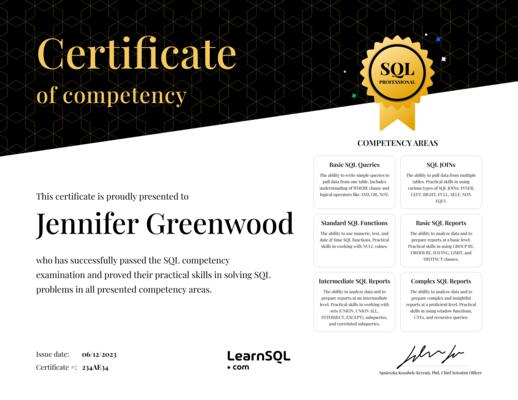Basic Track
SQL Fundamentals in PostgreSQL
Looking for a place to build your own solid SQL foundation? This learning path will teach you basic SQL statements like WHERE, GROUP BY, ORDER BY, and HAVING. You’ll also learn how to JOIN tables and add, modify, or remove data from a database.
4.80
11,993 Lerners enrolled
Free trial Yes
Certificate of completion Yes
Estimated time 30 h
Courses included 3
Skills you will gain
- Add, modify or remove data from a database using SQL.
- Write SQL queries to SELECT data from a table.
- Use various SQL joins (INNER JOIN, LEFT JOIN, RIGHT JOIN, FULL JOIN).
- Use aggregate functions (COUNT, MAX, MIN, AVG, SUM) with SQL GROUP BY.
- Sort results with the ORDER BY command.
- Write subqueries (including correlated subqueries).
- Use the set operations UNION, INTERSECT, and MINUS.
- Work with text, numeric, date and time, and other data types.
Last reviews
Description
This learning path is designed for complete SQL beginners with no previous knowledge of SQL or databases. It benefits data analysts working with relational databases or anyone interested in learning standard SQL. Scroll down for details.
Welcome to SQL Foundations! This learning path will give you a practical overview of SQL. You’ll find out how to write an SQL query and how to use common functions to work with a database. Our hands-on approach has you writing code all by yourself very early in the first course. We'll start simple (promise!) and learn the bare basics. Then we’ll slowly progress to more advanced features, like combining data from multiple tables with JOIN or building complex SQL queries using aggregations or subqueries (i.e. queries inside queries). By the end of this track, you’ll feel comfortable inserting, updating, and deleting data from a database. You’ll also be able to create a basic SQL report from scratch and work with multiple tables in one query.
What's in it for me?
- Smooth entry into the world of coding. No prior experience, extra software, or practice data sets needed.
- Well-defined learning path with 3 fully interactive courses. The courses are arranged in logical order, and the teaching process was carefully designed for beginners to gain confidence and experience.
- Learn more than just concepts. Get hands-on practice with our real code editor, real data sets, and real-life exercises.
- Online certification. After successfully completing each course, you will receive a certificate that you can publish on your LinkedIn profile.
- Trusted support system. Every course comes with access to our resource base, student2student support, mentor2student support, and technical support. You can also join our learning community and participate in on-task discussions.
- Hints and more. If you get stuck, you can use the included exercise hints. Or use the Discuss tab to ask questions and share insights with other members of the LearnSQL community. You can also drop us a line at contact@learnsql.com and we'll be more than happy to help!
Objectives:
- Add, modify or remove data from a database using SQL.
- Write SQL queries to SELECT data from a table.
- Use various SQL joins (INNER JOIN, LEFT JOIN, RIGHT JOIN, FULL JOIN).
- Use aggregate functions (COUNT, MAX, MIN, AVG, SUM) with SQL GROUP BY.
- Sort results with the ORDER BY command.
- Write subqueries (including correlated subqueries).
- Use the set operations UNION, INTERSECT, and MINUS.
- Work with text, numeric, date and time, and other data types.
Who should take this learning path?
- Complete SQL beginners. No previous knowledge of SQL, IT, or databases necessary!
- People who want to build the solid SQL foundation needed to work with databases.
- Anyone interested in learning the basics of SQL.
- Business (non-IT) users.
- Beginner data analysts.
- You!
Requirements:
- A web browser
- An internet connection

Track courses
-
SQL Basics in PostgreSQL130 Coding challenges Basic
Gaining insight from collected data plays an important role in today's information-driven world. During this online course, you'll practically learn how to write basic SQL queries to find answers to your business questions in the PostgreSQL database. No previous IT experience required.
-
Common Functions in PostgreSQL143 Coding challenges Basic
Learn how to use common PostgreSQL functions to process various types of data with ease. Soon, you'll be able to modify textual data, perform calculations, round numbers up or down, change date and time formats, and even adjust time zone info!
-
PostgreSQL INSERT, UPDATE, and DELETE Commands80 Coding challenges Basic
A data manipulation language (DML) helps you retrieve, store, modify, and delete data in a database. In this online course, you'll learn how to use PostgreSQL INSERT, UPDATE, and DELETE DML commands to control the information inside.

Get the Certificate of Competency in SQL
This certificate will confirm your practical SQL problem-solving skills
